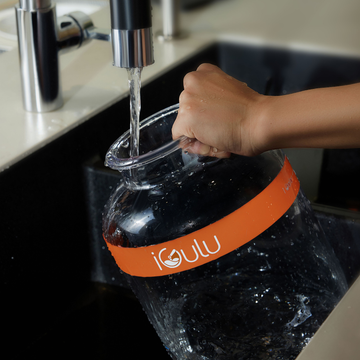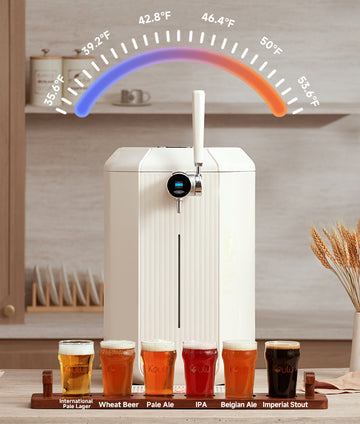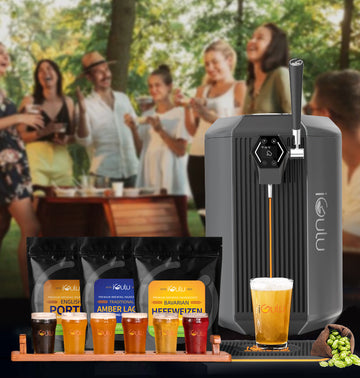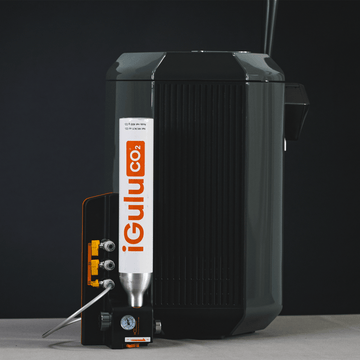Keeping your brewing equipment spotless clean isn’t just nerdy clean-freak stuff. Proper sanitation is key to brewing killer batches every time.
Achieving that is easy with CIP and SIP, your two new best friends when it comes to cleaning your iGulu. They save you time, make things way easier, and get your system squeaky clean so your beer always tastes great.
In this article, we’ll get into everything you need to know about CIP and SIP, as well as how to implement them in your brewing routine. Ready to clean smarter, not harder? Let’s dive in!
What Are CIP and SIP?
In brewing, cleanliness and sanitation are non-negotiables. Not only do they directly impact the safety of your beer, but also its quality.
That’s why CIP (Clean-in-Place) and SIP (Sanitize-in-Place) are critical steps of your brewing process.
CIP and SSIP are automated cleaning and sterilization processes used to clean equipment without disassembly.
CIP is all about flushing the system with hot water and a cleaning agent (caustic or detergent). This removes the gunk inside, including hop residue, sugars, proteins, and biofilms. You don’t want these inside your system, as they can spoil batches or clog lines.
SIP comes after CIP. This cleaning process involves using a sanitizing agent like peracetic acid to get rid of any lingering microbes.
Both of these steps are necessary for brewing. CIP prepares a clean surface–think of it as a deep clean–while SIP guarantees it’s safe for brewing. Skip either one, and you’re risking brew quality and safety.
How iGulu Machines Support CIP/SIP
iGulu is made with these cleaning protocols in mind, making cleaning straightforward for both new brewers and professionals.
The iGulu F1 features a fixed tubing system, internal keg, and easy-to-access components, all of which make internal rinsing easy. The manual specifically recommends rinsing the inner walls, lid, and liquid lines with a detergent, then following with a clean water flush. This is more than enough to get rid of residue buildup in hard-to-reach areas.
When it comes to commercial applications, iGulu’s Magellan line offers automatic CIP functionality. It takes care of the cleaning process automatically, cutting down on manual work and reducing the chance of mistakes. That kind of automation shows iGulu’s serious about keeping things clean, regardless of the brewer’s skill.
It doesn’t matter whether you’re crafting small batches or running a high-volume operation. In both cases, effective CIP and SIP procedures are non-negotiable. Luckily, iGulu machines are built to support both.
iGulu CIP & SIP Guide Step-by-Step
A reliable cleaning routine is key to consistent beer quality. Here’s how to clean the iGulu home brewer with standard CIP and SIP processes, step by step:
1. Pre-Rinse
Start by removing the bulk of the organic matter. Drain any spent wort or remaining liquid that might be inside the system. Then, run warm water through the internal lines, keg, and lid to flush out loose residue. This step is important, as it prevents caustic cleaner from being neutralized by leftover sugars or proteins.
2. Caustic Clean (CIP Step)
This is the part where all the gunk gets cleaned out. Prepare a 1–2% caustic solution or opt for a brewery-grade alkaline cleaner. Run the solution through the system for about 20 minutes or so. That should be enough to reach all the internal surfaces, including tubing and connectors.
Then, rinse thoroughly with warm water. This will get rid of any chemical residue that could mess with the taste of your brew.
3. Sanitizing (SIP Step)
Once the system is clean, it’s time to sanitize. For this protocol, use a no-rinse sanitizer such as peracetic acid, and dilute it per the manufacturer's instructions. Run the solution through the system for about 5-10 minutes, which should be more than enough to neutralize any potential microbial threats.
Drain the system completely (or let it air-dry) before doing a new brew cycle.
Tips and Best Practices
To get the most out of your cleaning and sanitizing routine, there are a few proven tips to keep in mind.
First, maintain the right temperature. Generally, cleaning agents perform best between 95°F and 140°F. If the water is cooler than that, its effectiveness is reduced, while higher temperatures may damage components or degrade chemicals too quickly.
For the best CIP results, follow what’s called the Sinner’s Circle–a balance of four factors that really make a difference.
-
Chemical: Use the right type and concentration to break down the gunk.
-
Temperature: Stay within the ideal range for activation.
-
Time: Don’t cut corners–each phase should run long enough to be effective.
-
Action: The flow rate has to be strong enough to reach every part of the system.
Stick to the right timing. Run CIP after every fermentation cycle to keep buildup from becoming a problem. Then, do a SIP right before starting your next batch to remove any lingering microbes that could mess up your brew.
Keep in mind that, even with regular cleaning, tubing can wear out or develop residue pockets over time. That’s why it’s important to check hoses and connectors regularly for any signs of discoloration, cracks, or brittleness. If necessary, replace them to maintain sanitary conditions.
By incorporating these best practices, you not only keep your iGulu system in shape but also ensure each brew starts in a contaminant-free environment. Clean system, clean beer.
Common Cleaning Mistakes
Even with a proper CIP/SIP routine in place, small missteps can happen. And they can lead to contamination, off-flavor, or equipment damage. All of that is avoidable if you know what common cleaning mistakes are and how to avoid them.
Cleaning alone doesn’t guarantee sanitation. That’s why skipping the sanitizer leaves the door wide open for microbes, especially in hoses, kegs, or valves. After cleaning, always sanitize with a reliable agent like StarSan, a no-rinse, food-safe sanitizer that’s a go-to for brewers worldwide.
Concentration also matters. If you make the solution too weak, it won’t break down proteins, sugars, and other gunk. On the other hand, if it’s too strong, the solution can leave a chemical residue or even cause corrosion. That’s why it’s important to follow manufacturer dilution guidelines—typically 1–2% for caustic cleaners used in CIP cycles.
Cold water alone isn’t enough. You need hot water (95–140 °F) to all the nasty stuff inside the system effectively. Plus, a warm pre-rinse also helps prevent caustic solutions from being neutralized too quickly.
Finally, don’t forget the components like gaskets, O-rings, and seals. While small, these components can easily harbor bacteria. Take them out, give them a good scrub with detergent, and then sanitize them well. Keeping these hidden parts clean is key to keeping your whole setup safe over time.
FAQs
How often should I CIP my iGulu brewer?
You should run a CIP cycle after every fermentation to remove organic residues like yeast, sugars, and proteins.
Can I run SIP without doing a caustic CIP?
No, because sanitizing without cleaning first isn’t effective. SIP only works on clean surfaces, as dirt and organic residue protect the microbes from the sanitizer.
Which cleaning agents are safe for iGulu machines?
Use a 1–2% caustic solution for CIP. For SIP, the best sanitizer for the iGulu brewer is StarSan–no-rinse, food-safe, and gets the job done without complicating your routine.
Is rinsing with cold water enough?
No, cold water doesn’t effectively dissolve the gunk. Use warm water for proper cleaning.
Do I need to disassemble parts for cleaning?
You typically don’t need to take the whole thing apart, as iGulu systems are built for clean-in-place cleaning. However, you should still remove and manually clean parts like gaskets, seals, and any detachable fittings every once in a while to catch any wear or buildup.
Can I use bleach to clean my iGulu brewer?
Don’t use bleach, as it can damage metal components and leave behind harsh chemical residues.
How long should sanitizer circulate in the SIP?
Run sanitizer through the system for 5–10 minutes.
When should I replace tubing and seals?
Replace as soon as you notice the first signs of wear, discoloration, cracking, or stiffness.
Can I use dishwasher-safe parts in automatic cycles?
Yes, if a part is labeled dishwasher-safe by iGulu. That said, this does not replace CIP/SIP routines. Dishwashers can’t reach all internal surfaces or sanitize tubing and sealed connections.
What happens if I skip CIP or SIP?
If you skip CIP, residue can build up, causing off-flavors and uneven fermentation. On the other hand, skipping SIP leaves the door open for potential contamination, which can spoil a whole batch. Both steps really matter to keep your brews solid.
Clean System, Happy Brew
Keeping up with CIP and SIP is the secret to consistently clean equipment and great-tasting brews. These steps are simple, yet they’re essential for keeping your batches from contamination and off-flavor.
Brewing with iGulu is a breeze–and so is cleaning. So, don’t settle for anything less than top-quality beer. Start using the iGulu homebrew cleaning routine–we promise it’ll feel as effortless as brewing itself!






